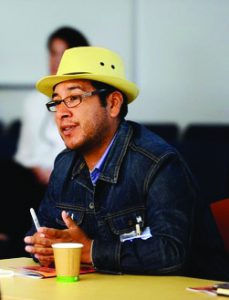Edgar Bautista-Zuñiga: Dialogue and Service

Teaching children how to solve their problems and how to learn from their mistakes can seem like something near impossible for many teachers and parents. But for Edgar Bautista-Zuniga, a teacher and restorative justice coordinator at King-Chavez Academies, getting kids to change their conduct requires honesty and talking things out, instead of just using punishment to change bad behavior.
Bautista-Zuñiga was born in Mexico City, although he lived in San Miguel de Allende and other parts of Mexico due to family issues in his youth.When he was only 19 years old, Bautista Zuñiga decided to go live in Pasadena, California with two sisters he had in this Los Angeles-area city. Not much later, Bautista Zuñiga chose to go further north, up to San Jose, California.
“I didn’t like Los Angeles and I also went up with my future wife who was going to study at San Jose State University,” Bautista Zuñiga recalled.
While living in northern California, Bautista Zuñiga enrolled in English classes, as well as community college courses. His studies lead him to receive a bachelor’s degree in migration and immigrant children’s education from New College of California, San Francisco.
After earning his degree, Bautista Zuñiga and his wife found jobs in San Diego, with him finding a job at King-Chavez Academies. During his second year of working at King-Chavez, Bautista Zuñiga, who was then an art teacher, began to observe and take note of the problems and needs that the children of the school faced.
“In this school, the majority of students are immigrants or children of immigrants,” Bautista-Zuñiga shared. “So I focused on trying to do something in the community to help out students.”
The following school year, as a fourth grade teacher, Bautista-Zuñiga began to receive several students with behavioral problems from other classrooms into his class.
“There are not a lot of men in pedagogy and education and the role of a male teacher is often seen as a stricter on than that of the female teacher,” Bautista-Zuñiga elaborated. “So they began to send students with behavior problems to me.”
“If someone behaved badly, they would tell them ‘you’re going to Mr. Bautista’s room,’ so I was in my classroom with my class plus the rest of the students that got in trouble too,” he added.
After many cases of students coming into his class, Bautista-Zuñiga and other teachers gathered to discuss what could be done about about the behavior problems that students had. Eventually the group of educators came across the new concept known as “restorative justice”, a series of practices which looks to rehabilitate through reconciliation and dialogue.
“I have a friend in San Luis Obispo who works as a correctional officer and he trained me to deal with certain situations with children who had behavioral problems and problems at home,” Bautista-Zuñiga said.
With the training he received from his friend, who had been in corrections for 18 years, and what he knew about the community around the school, Bautista-Zuñiga and the school principal began to form the restorative justice program at King-Chavez Academies. Within the program, Bautista-Zuñiga utilizes a meeting structure in which a student with unwanted behavior meets with people affected by their actions, including parents and teachers.
“These meetings have to be communal and have to have a point to follow so that children can learn that their actions have consequences, but without feeling pressured,” Bautista-Zuñiga explained. “More than anything, children have to be given the opportunity to think for themselves and the questions we ask are balanced and allow the students to know their mistakes without making accusatory statements to them.”
Bautista-Zuñiga claims that in these meetings the important thing is to bring about a reconciliation, instead of declaring anyone guilty and giving out punishments.
“When a kid comes to a restorative justice meeting, I want them to learn from the situation because if you just suspend a student, they’ll just stay at home and won’t learn anything.”
Bautista-Zuñiga points out that it is because every case and student are handled individually that positive changes can be made effectively.
“We usually have very few students who are repeat offenders, so we can say that the program works and is pretty effective, ” he said.
Although the goal of these meetings is never to force friendships or create harmony where there was none, Bautista-Zuñiga states that after many restorative justice sessions involved students often do become friends and, in bullying cases, both parties can often set aside their differences and manage to sincerely respect and tolerate each other.
After years of imparting this student discipline model, this teacher believes that beyond pushing this model forward or creating a legacy, the important thing is to serve his community.
“I don’t want a tag or a flag that says leader, I only want to work for my community and to be someone who advocated for the community,” Bautista-Zuñiga closed.






